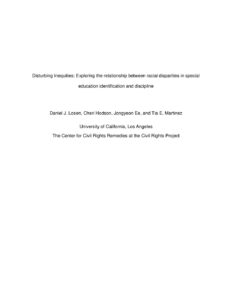Abstract
In this study we use the National Longitudinal Survey of Adolescent Health (Add Health) dataset to evaluate the long-term influence of school discipline and security on political and civic participation. We find that young adults with a history of suspension in school are less likely than others to vote and volunteer in civic activities after high school, suggesting that suspension negatively impacts the overall likelihood that youth will engage in future political and civic activities. Though Black and Hispanic students suffer negative long-term effects of school suspension far more frequently than others, the results suggest that the intensity of the effect of suspension is consistent across racial/ethnic groups. Overall, these findings are consistent with prior theory and research highlighting the long-term negative implications of punitive disciplinary policies and the salient role schools play in preparing youth to participate in a democratic polity as adults. We conclude that suspension, in particular, is anti-democratic insofar in that it substitutes the exclusion and physical removal of students for dialogue and collaborative problem-solving. The research lends empirical grounds for recommending the concrete reform of school governance and the implementation of more constructive models of discipline.
In compliance with the UC Open Access Policy, this report has been made available on eScholarship:
